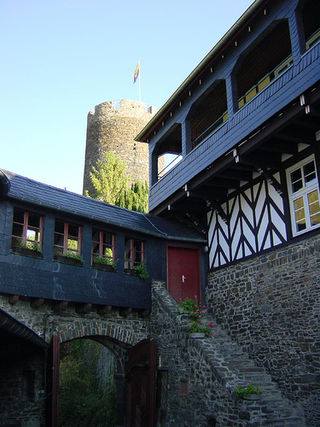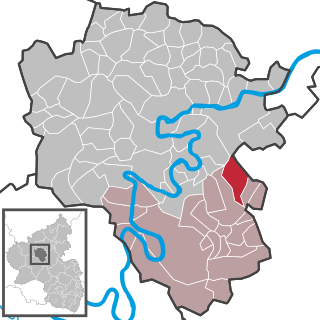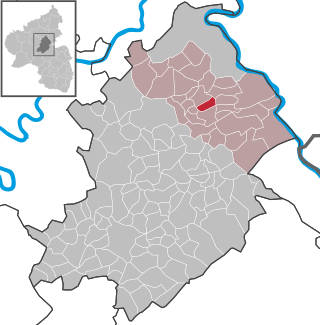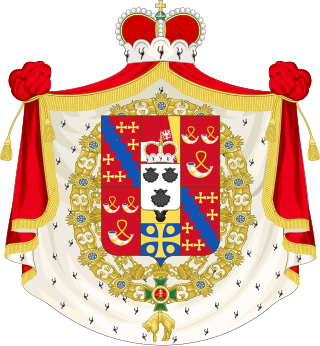
Metternich Castle is an ancient castle in the Rhineland-Palatinate state of the Federal Republic of Germany. It is also known as the Beilstein Castle (Burg Beilstein), being within the municipal bounds of in Beilstein, Rhineland-Palatinate.

Metternich Castle is an ancient castle in the Rhineland-Palatinate state of the Federal Republic of Germany. It is also known as the Beilstein Castle (Burg Beilstein), being within the municipal bounds of in Beilstein, Rhineland-Palatinate.
The castle, now in ruins, is located in the municipality of Beilstein on the river Moselle.

The history of the castle goes back to 1268 when the castle (referred to as Bilstein Castle) was first mentioned. It is thought the castle is even older, with some historians indicating 1129 as the year of construction.
Until the first half of 17th century, the castle was owned by Counts von Nassau-Dillenburg. In 1637, the castle became the property of the House of Metternich, hence its current name, Metternich Castle. The last member of the family to own the castle was Klemens von Metternich, one of the most famous diplomats of the Austrian Empire – he was foreign minister from 1809 to 1848.
In 1689, during the Nine Years' War, the castle was destroyed by French troops.
Cochem-Zell is a district (Kreis) in the north-west of Rhineland-Palatinate, Germany. Neighboring districts are Mayen-Koblenz, Rhein-Hunsrück, Bernkastel-Wittlich, and Vulkaneifel.

Katz Castle is a castle above the German town of Sankt Goarshausen in Rhineland-Palatinate. The castle stands on a ledge looking downstream from the riverside at Sankt Goar. It was first built around 1371 by Count William II of Katzenelnbogen. The castle was bombarded in 1806 by Napoleon and rebuilt in the late 19th century, in 1896–98. It is now privately owned, and not open for visitors.

Bischofstein Castle is a castle by the Moselle in Germany. It sits between Moselkern and Hatzenport; these and the castle face the borough of Burgen. It was a stronghold belonging to the Archbishops of Treves.

Lichtenberg Castle is a ruin of the spur castle type; with a length of 425m (1,394 ft) it is the biggest castle ruin in Germany. It is located near Thallichtenberg in the district of Kusel in Rhineland-Palatinate.

Lahr in the Hunsrück is an Ortsgemeinde – a municipality belonging to a Verbandsgemeinde, a kind of collective municipality – in the Rhein-Hunsrück-Kreis district in Rhineland-Palatinate, Germany. It belongs to the Verbandsgemeinde of Kastellaun.

Mengerskirchen is a municipality in Limburg-Weilburg district in Hesse, Germany.

Alflen is an Ortsgemeinde – a municipality belonging to a Verbandsgemeinde, a kind of collective municipality – in the Cochem-Zell district in Rhineland-Palatinate, Germany. It belongs to the Verbandsgemeinde of Ulmen, whose seat is in the like-named town.

Altstrimmig is an Ortsgemeinde – a municipality belonging to a Verbandsgemeinde, a kind of collective municipality – in the Cochem-Zell district in Rhineland-Palatinate, Germany. It belongs to the Verbandsgemeinde of Zell, whose seat is in the municipality of Zell an der Mosel.

Beilstein is an Ortsgemeinde – a municipality belonging to a Verbandsgemeinde, a kind of collective municipality – in the Cochem-Zell district in Rhineland-Palatinate, Germany. It belongs to the Verbandsgemeinde of Cochem, whose seat is in the like-named town.

Braunshorn is an Ortsgemeinde – a municipality belonging to a Verbandsgemeinde, a kind of collective municipality – in the Rhein-Hunsrück-Kreis (district) in Rhineland-Palatinate, Germany. It belongs to the Verbandsgemeinde of Kastellaun, whose seat is in the like-named town.

Norath is an Ortsgemeinde – a municipality belonging to a Verbandsgemeinde, a kind of collective municipality – in the Rhein-Hunsrück-Kreis (district) in Rhineland-Palatinate, Germany. It belongs to the Verbandsgemeinde Hunsrück-Mittelrhein, whose seat is in Emmelshausen.

The Lordship of Winneburg and Beilstein was a territory of the Holy Roman Empire made of non-contiguous parts located in the Moselle Valley around Winneburg Castle near Cochem, and Beilstein, on the Moselle River. It should not be confused with the County of Beilstein, or Nassau-Beilstein, which belonged to the House of Nassau.

Schloss Veldenz in the Hunsrück upland, on a steep vale draining into the Mosel is a castle ruin about 1.5 kilometres (0.9 mi) southeast of the village of Veldenz in the German state of Rhineland-Palatinate.

Stolzenfels Castle is a former medieval fortress castle ("Burg") turned into a palace, near Koblenz on the left bank of the Rhine, in the state of Rhineland-Palatinate, Germany. Stolzenfels was a ruined 13th-century castle, gifted to the Prussian crown prince, Frederick William in 1823. He had it rebuilt as a 19th-century palace in Gothic Revival style. Today, it is part of the UNESCO World Heritage Site Upper Middle Rhine Valley.

The House of Metternich was an old German noble family originating in the Rhineland. The most prominent member was Prince Klemens von Metternich, who was the dominant figure at the Congress of Vienna (1814–1815). As a former reigning house (mediatised), the Metternich family belonged to the small circle of high nobility.

Frankenstein Castle is a medieval fortification on a spur above the village of Frankenstein, Rhineland-Palatinate in the Palatinate Forest in Germany. Its name derives from the local House of Frankenstein.

The ruins of the Thurant Castle stand on a wide slate hill spur above the villages of Alken on the Moselle in Germany. The castle is in the district of Mayen-Koblenz in Rhineland-Palatinate and belongs to the spur castle type. Vine gardens on the sunniest slope.

Gödersheim Castle is a ruined, Late Gothic, water castle a few kilometres from Wollersheim, a village in the borough of Nideggen, in the county of Düren in the German state of Rhineland-Palatinate. It is located in the valley of the Neffelbach and has been protected as an historic monument since 22 October 1993. The owners of the castle ruins and surrounding land were the Rhineland Regional Association but, in 2016, an immediate neighbour, Helmut Waldmann, owner of the Gödersheim Mill, bought the ruins and adjacent buildings. He intends to demolish the buildings and build flats in the gatehouse and the ruins.

Hammerstein Castle is the ruin of a 10th-century mountain castle in Rhineland-Palatinate, Germany, the oldest in this entire Middle Rhine Valley. The ruin of one of its watchtowers still overlooks the Rhine at an altitude of 195 m, near the village of Hammerstein. The Rheinsteig hiking trail passes close to the ruins which can be reached via a small path.